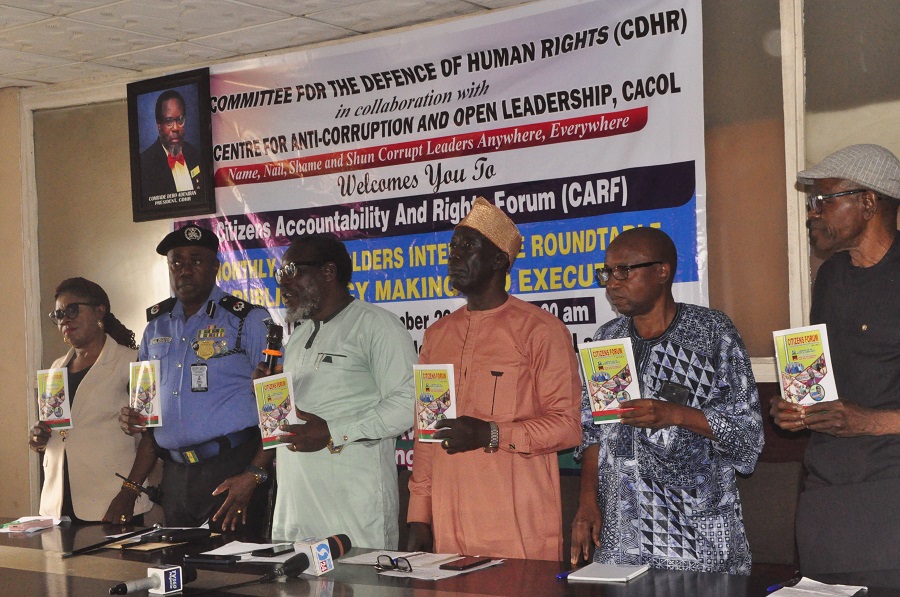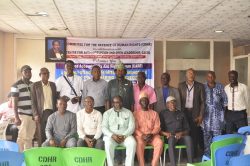News
Stakeholders task Nigerians against corrupt practises at CARF
Published
1 year agoon
By
Olu Emmanuel
The Independent Corrupt Practices and Related Offences Commission (ICPC) and other stakeholders have canvassed the importance of collective responsibility in stemming the endemic nature of corruption bedevilling the Nigerian society.
Speaking at the monthly gathering-Citizens Accountability and Rights Forum (CARF), organized by the Committee for the Defence of Human Rights (CDHR) in partnership with Centre for Anti Corruption and Open Leadership (CACOL), stakeholders in the anti-graft agency harped on the need to expose young Nigerians to the negative impact of corruption early in life so as to discourage the act.
At the forum themed “Fighting Corruption in A Complex Society Like: Deficiencies in Public Awareness of Corruption Reporting System,” held at the Rights House, Ikeja, Lagos on Thursday, stakeholders took turns to critique the Nigerian situation while stressing that corruption is a social vice.
The President of CDHR, Debo Adeniran stated that corruption is an anti-social attitude that awards improper privileges to some people contrary to legal and moral authority.
“Corruption in Nigeria is a constant phenomenon and in 2012, Nigeria was estimated to have lost over $400 billion to corruption. According to Wikipedia, the rise of public administration, discovery of oil and natural gas, are two major events which led to incidents of corrupt practices in the country,” he said.
The CDHR President also said that the government has made efforts to minimize and reduce corruption through the enactment of laws and enforcement of integrity system.
In her speech, the Lagos ICPC Assistant Commissioner, Mrs Florence Bariboloka, described corruption in Nigeria as sociological, economic, and largely a behavioural act, saying that it is about man’s attitude to norms, systems and other abuses of office, position or process.
Mrs Bariboloka noted that the ICPC Act 2000 states that corruption arises from bribery, fraud and other related offences.
Speaking further, she said that ICPC has three main objectives; investigation, prosecution and prevention.
According to her, investigation is when they receive petitions from members of the public, and prosecution is when the court finds the suspect guilty, saying that such person would be jailed.
The Assistant Commissioner further said that prevention is done through a review of the systems, and procedures from the ministries, departments and agencies for the government and sometimes for private organizations.

‘We go to the ministries and government parastatals to see how they operate, especially in financial obligations,” she added.
The ICPC official stressed that the anti-corruption agency also teaches members of the public through their public enlightenment department, educates the public by identifying corruption in the society.
ALSO READ: Ayodele Olawande drives youth empowerment with NiYA initiative
Mrs Bariboloka said that all these are means of letting the public know that corruption is not good, that it doesn’t augur well in any country or society, and that it also affects development and integrity.
She emphasised that corruption in Nigeria affects unemployment, huge human capacity, skill gaps and revenue.
“It also lowers trust of citizens in law. In this country, we see some people as being above the law. Some people steal little money, they give them lengthy jail terms, whereas our politicians steal billions of naira, how many of them are in prisons or in courts? So, there are different types of corruptions in the country.
“The measure put in place by the government to curb the menace include Criminal and Penal Codes that were put together in the colonial era. We have the National Drug Law Enforcement Agency (NDLEA) and Money Laundering Acts. There is a technical unit of governance and exploration reforms which were carried out by former president Olusegun Obasanjo.
“We also have the National Financial Intelligence Unit, the ICPC, which was established in 2000 and the Economic and Financial Crimes Commission (EFCC) that was established in 2004.
“The use of Auditor General, the Nigerian Police, the judiciary and others are efforts made by the government to ensure that corruption is minimized in the country,” she said.
The representative of the ICPC agreed that the officials of the agency are not enough to serve a population of over 220 million Nigerians in dealing with corrupt practices.
She however, said that the only way the country could achieve fight against corruption is through the young ones, but that they should be made to know that corruption is very bad and that it needed to be curbed.
Speaking from the perspective of law enforcement agents, particularly the Nigerian Police Force, the Commander of Area F, ACP Paul Okafor, said that, “when the head is right, the whole body would be right.”
Recall that the Inspector General of Police, Kayode Egbetokun had made it known from assumption of office that he’s against anything called corruption. ACP Okafor said that his boss makes this known in any fora he attends.
ACP Okafor further stated that though there could be one bad egg among many, but that when people spot one bad egg, they should take note of that bad one among the good ones.
The top police officer seized the occasion to state that he is not part of the bad eggs. This, he said, could be verified even outside his jurisdiction, where he had served.
He however, admitted that the need to make the country free of corrupt practices is a collective one.
“People also have roles to play, if there are no givers, there won’t be receivers. But concerning the receivers, the matter could be taken to the authority. I want to assure you that we will triumph on the fight against corruption,” he added.
Trending

 Entertainment6 days ago
Entertainment6 days agoSimi addresses resurfaced 2012 tweets amid online backlash

 Health1 week ago
Health1 week agoSCFN, LUTH introduce bone marrow transplants as curative treatment for sickle cell

 Health4 days ago
Health4 days agoDeclassified CIA memo explored concealing mind-control drugs in vaccines

 Football1 week ago
Football1 week agoHarry Kane nets brace as Bayern edge Frankfurt 3–2 to go nine points clear

 Football1 week ago
Football1 week agoLate Flemming header stuns Chelsea as Burnley snatch 1–1 draw at Stamford Bridge

 Crime4 days ago
Crime4 days agoSenior police officers faces retirement after Disu’s appointment as acting IGP

 Education6 days ago
Education6 days agoPeter Obi urges JAMB to address registration challenges ahead of exams

 Crime1 week ago
Crime1 week agoTwo killed, seven injured in early-morning shooting in Richmond’s Shockoe Bottom

